#Meta:nagant
Explore tagged Tumblr posts
Text
I wonder if people realize that the reason why the League was allowed to exist for as long as it did without violent suppression from the HPSC is only because of the threat of the noumu
So. We know from Nagant's backstory that anything capable of shaking up the status quo was quickly and covertly executed without much fanfare:
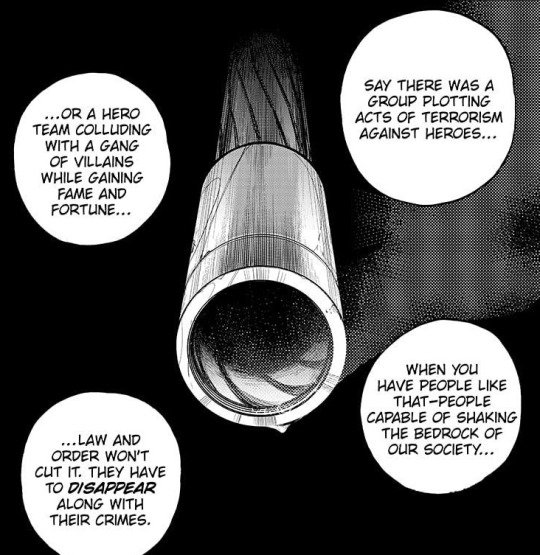
In fact, the Commission was so indiscriminate in applying that rule that both villains and heroes are said to have died under her rifle.
The reason why not even heroes were exempt from this ruthless retribution is simple. The Commission, as an institution born to regulate the spreading phenomenon of vigilantism and the chaos that follows, wasn't created with the purpose of administering justice, but rather to do just that: regulating society. They're not cops. They're an odd mix between politicians and spin doctors. On one hand, their official role is that of overseeing heroics as a whole—issuing hero licenses, coordinating pro heroes, analyzing and administering the data that goes into the hero rankings, that sort of thing. But on the other hand, their less official and more prominent role is that of puppet masters of the hero narrative. They feed a favourable (for the heroes, that is) interpretation of events to the media, and have done so for years, in order to protect the citizens' faith in the status quo.
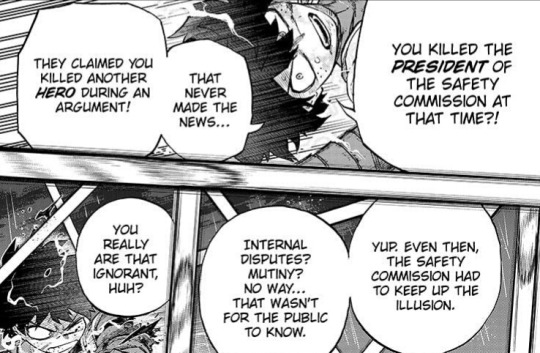
This is why, for example, the truth of who Nagant actually killed to get thrown into jail isn't public knowledge. Letting the citizens know that she'd offed the Commission President would raise question. People would wonder why a fairly beloved heroine would turn against the institution that trained her. They'd want to know the motive behind the murder of such a prominent figure in the industry. In other words, revealing any specifics would not only expose their internal disputes to the public eye, but also, and most importantly, instill doubt.
That's what it always boils down to. The Commission exists for one purpose: protecting the hero system from anything that might make it crumble—be it doubt, social unrest, and last but not least the worst case scenarios themselves, mistrust for heroes and the reign of terror of villains.
The current arc gives us a bit more insight into that. What happens when the citizens stop trusting heroes as protectors? And what happens when villains shake up the population so much that hope and faith in things ever getting better starts to sound like a child's tale? Lawlessness is what happens. A second coming of the vigilantism era, where untrained and unregulated civilians take matters into their own hands to feel less vulnerable, to retain some control in the face of such uncertainty.
So we come full circle: all of this is why the Commission acted around the law so much, and sent Nagant against anyone who so much as thought of endangering the status quo, corrupted heroes included:

Prehemptive killing for the greater good was not above them, either. Nagant says it best: it's a system with two sides to it. The "good" side, the glorious one that gets the spotlight, made of heroes as saviors and cool fighters who protect people from the bad guys... And then the dark side, the ugly truth that for such neat labels to exist, anything blurring the lines or threatening that artificial peace had to be violently shot in the head for appearances sake. So much so, that even "starting to talk about it" is considered a life sentence.
Enter the League.
This is where things get interesting, because the Lov seems to challenge everything I just went over, at least on the surface.
If it's true that even voicing discontent about the current state of things warrants a quick and covert execution... how come Shigaraki&co could merrily call themselves The League of Villains and put out a whole Manifesto of Everything Wrong with the Hero System without getting their throats cut by a featherblade two days later?
At face value, it might seem like such suppression methods are a thing of the past. They were true once, but now things aren't as dire as they used to be.
Except... This isn't true. It's become a lot subtler than a gun-themed heroine shooting people in the head, true, but... *gestures at Hawks and Twice's subplot* this is still very much a thing. Twice was killed for the threat his quirk at full power posed to hero society.
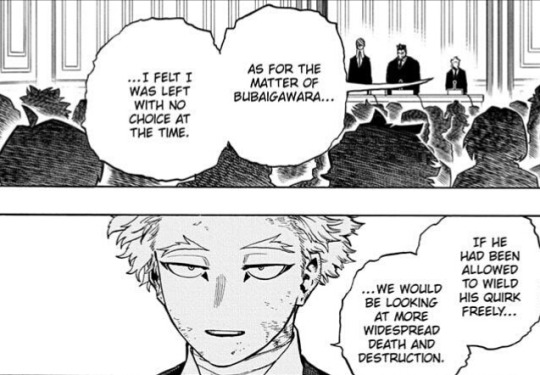
He wasn't arrested and thrown into Tartarus. He was murdered on the spot for the crime of possessing a dangerous quirk. Not even using it. Possessing it. It couldn't get more obvious if it tried: it's a blantant parallel to Nagant executing that guy above. Again, not for the crime of acting on his subversive ploys. But for discussing them.
Let me clarify that I'm not digging this back up to spark another debate on Ethics and Choices. This fandom has seen enough essays on that already. I'm bringing up the example of Twice specifically because Twice was killed by Hawks, a Commission operative, on Commission's orders. This is significant because it's meant to say more about the institution that regulates heroics more than it does about the victim of their brainwashing.
It's an established unspoken rule that heroes don't kill. The story goes above and beyond to state this. No matter how vile villains are, under normal circumstances they're always captured alive. Take for example All For One. He's arguably much more dangerous than Twice. While it's true that Twice's quirk could potentially overthrow an army and thus throw the nation into chaos, the more doubles he makes, the frailer they become. His strength lies purely in numbers, but a single skilled pro hero was enough to overpower him and render him harmless. AFO, on the other hand, has his finger in every pie and doesn't just rely on a quirk (or five or a dozen) to be dangerous. He has a network of loyal henchmen, he has enough charisma to draw followers to him, and his power extends beyond Japan. It reaches all the way across the ocean and into America. He's feared on a woldwide scale. Yet, he wasn't assassinated on the spot. He was thrown into Tartarus, despite how clear it's now become that keeping him alive was a huge faux pas for the heroes. So why did they?
The reason is simple. It was All Might who brought him in, and not the Commission. We know that they too had their eyes on him,

and it's not hard to guess what Nagant was asked to do if she were to find him. But All Might is no hired gun, and he doesn't answer directly to the HPSC. Thus, AFO got to live, unlike anyone else the Commission deems "a threat."
Now, while Hawks has less of a double life than Nagant, he's still expected to carry out orders for what the Commission decides is the greater good. Just like his predecessor. Since he was taken in as her replacement, the truth of the matter is that he inherited her role as the Hand of the Commission. He handles their dirty laundry, oftentimes against his will,
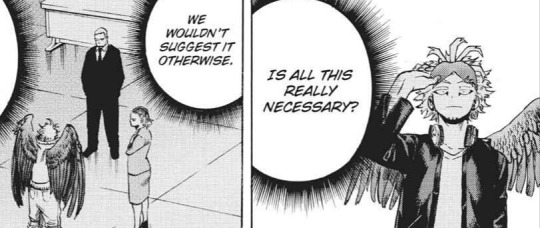

because it is "necessary" to bring peace.
The only real difference between them is that unlike Nagant, his talents lie more in the reconnaissance and intel gathering fields, so we don't see him act as a hired assassin more than that single time. Yet, I want to underline that the spying he does is still on Commission's orders, and as such, it is instrumental to the Commission's agenda as much as Nagant's assassinations. Besides, the fact that Hawks struck to kill despite his private desire to save Twice further emphasizes that the HPSC hasn't changed overnight simply because their President changed. When an individual becomes too dangerous, too much of a threat to what they've built, the killing order can still be issued—and it has been.
But over time, their need for manifacturing an illusion of peace lessened. I'm not sure how Kaina's and Toshinori's timelines intersect since we aren't given clear ages for either... But... with All Might's rise to the top, organized crime took a beating and dropped at historic lows. As such, I assume there were less and less potential threats to the status quo, and society thrived in actual peace without a need for the Commission to kill people in the shadows.
In fact, organized crime is so outdated that when Shigaraki comes around and starts recruiting allies, what he gathers is a bunch of uncoordinated small fries.
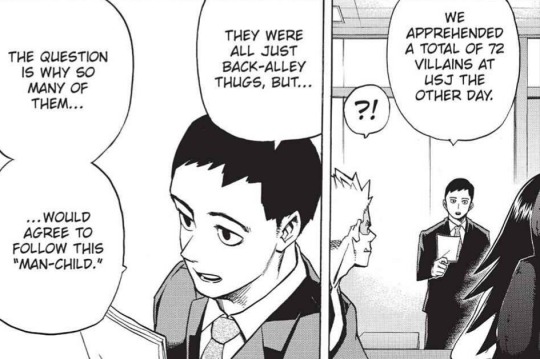

As usual Viz phrases things with zero sympathy for the villains and waters it down to "kicked around" but both the og Japanese and the official Italian translation here say "oppressed". These 72 people followed Shigaraki because they felt the allure of lashing out at hero society. It was a suicide expedition, attacking a school packed with pros, but they still did it. All of them except Shigaraki and Kurogiri were apprehended, with most of them swiftly defeated by a bunch of high school freshmen. We could go as far as calling this first attempt at a villain group disorganized crime.
So between Nagant's and All Might's combined efforts, people who are dissatisfied with hero society have all but stopped gathering together to express those complaints, or to plan an effective way to change things. Either by choice or by force.
This of course doesn't mean society naturally evolved into something everyone's satisfied with. We know from many characters' backstories that despite the front as an utopia, hero society is not devoid of flaws. Inequality and discrimination run rampant, and with them, an anti-establishment sentiment from all those people oppressed or overlooked by it. But by the current point in the story, when the League is officially created, the Commission successfully achieved their goal: making those sociopolitical fringes of the population so small and quiet—as opposed to the all-encompassing faith in heroism—that they've basically become irrelevant. A minority that still exists, but that can be silenced easily with the iron fist of the law if need be.
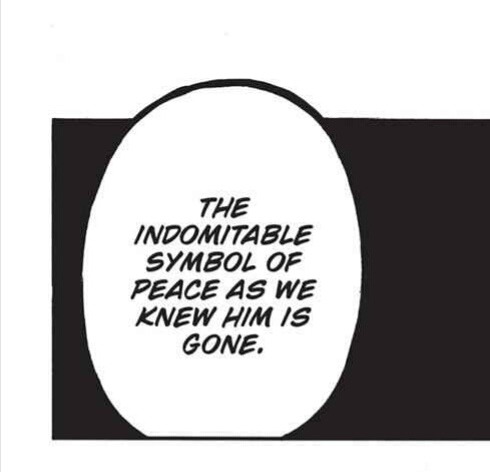
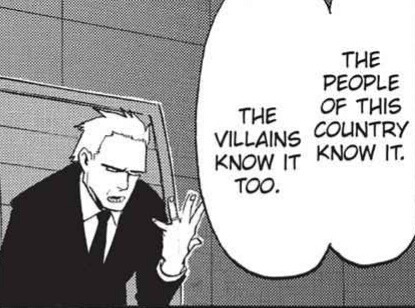

But then the League went and ruined that. They not only succeeded at spreading fear amongst the population, but they've also exposed all the cracks in the system, rendering it vulnerable. Where fear festers, doubt seeps in. And we've seen what happened when the League was left to grow stronger and stronger. They've eventually gotten strong enough to level cities alone, and they've put enough of a dent in that faith that civilians don't trust heroes by default anymore.
So why are they still breathing? Why did the Commission take the risk of letting them be, allowing them to gather more and more allies and cement themselves as the rulers of the underworld until they became strong enough to potentially destroy the hero system itself?

The noumu. I'm telling you, it's because of the noumu.
No, but seriously. It's really because, at least at first, the League was a relatively small fry, compared to the threat of bioengineered superhumans. Shigaraki didn't leave enough of an impression on the police working on the case to suggest they believed he would make it far. They labeled him an unstable manchild, someone more fearsome on accounts of his ability to just throw noumu at problems than because he was fearsome himself. The only serious threat the League posed at USJ was thanks to that single noumu. Then there's Hosu, and Shigaraki only appears to unleash several weaker, white ones to wreack havoc.
By then, the Commission starts taking an interest in the Lov. We are told that Hawks was supposed to take part in the Kamino raid,
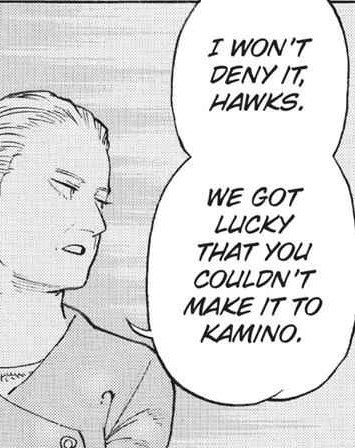
but didn't because he couldn't make it on time.
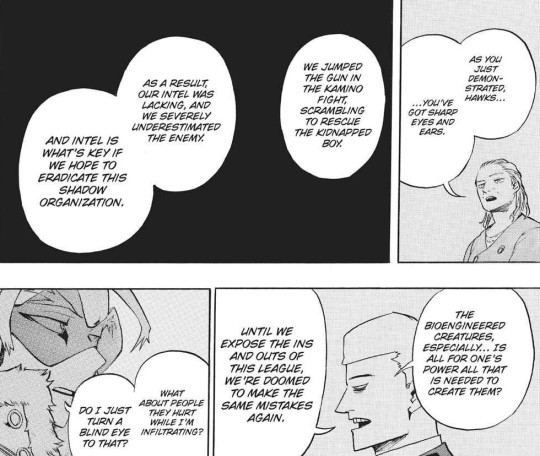
But interestingly, they also hint that this entire operation was rushed. Storming the place before they could get more intel on the League and on the noumu wasn't the plan. But a student was kidnapped under the pros' noses, and the school was in hot waters with the media for it.
Now, let's consider for a moment UA's status. As one of the most important hero schools in the country, and as the sole one that televises its sport festival every year as a big spectacle on par with the Olympics, UA has both prestige and power. Probably more than other schools, in fact, considering they're always everyone's first choice both when it comes to enrolling in it and when pros needs interns and manpower to thicken their ranks. UA is the dream of many starry eyed kids who hope to make it big in the industry.
Yet, all that prestige and status doesn't stop them from becoming a target for public blame. The fact that the media put the school under scrutiny for how they handled the crisis at training camp is not just bad press for the school. It's also bad press for heroes in general because UA is widely regarded as the pinnacle of the hero industry. They train the best students to become top of the food chain once they reach pro. There's a reason why Bakugou, obsessed with being the best, wanted to enroll in UA and not, say, Shiketsu. UA's name itself is a pun on the Japanese word for "hero" (UA, read as Yuuei, is eiyuu, hero, backwards).

So a failure of the school is a failure that is capable of shaking the trust in heroism itself. And that's precisely what worries the Commission.

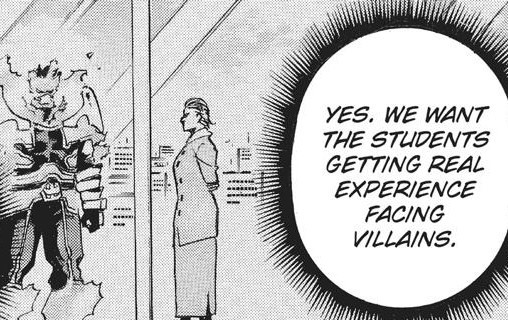
After all, we know from later arcs that they don't actually care about endagering students at all. In fact, they're perfectly fine letting kids be on the frontlines of a war without even informing their parents of where their kids are being sent to. So, to tie this back to the question by the journalist above, the Commission isn't interested in reassuring the families of their students that the kids are fine. All they care about is what they've always cared about: spinning a narrative where faith in heroes is justified by results. Since heroes always return from a mission with a victory in the bag, the trust that the public puts in them, and thus the HPSC by association, is well-placed and needs not be questioned.

So when the attack on training camp happens and the heroes face one of their first real losses—26 wounded, 1 kidnapped—the Commission scrambles to fix this PR disaster. Despite the sparse intelligence they have on the League, and despite their own reticence, they greenlight the Kamino raid anyway. They think that what they have is enough to sate the angry media into trusting them again. They'll rescue the kid and thus save face. And if in the process they can apprehend the League and destroy a noumu lab all at once? Even better. But publicly, it's for the kid.
Except, it turns out that the lab was a decoy, and not the original place where the noumu come from. It was planted there as a distraction, or possibly as a storage unit for Shigaraki to use freely, but disposing of it doesn't neutralize the threat of the noumu science itself. And indeed, AFO'S appearance soon after proves just that. He comes with more monsters in tow, and has his own teleporting quirk to move them around. Basically, AFO was playing two moves ahead of the HPSC. And I think Kamino is where the Commission finally realized that, too.
So what do they do next? They show us their real agenda for the first time and plant a mole in the League's ranks.
The primary goal of Hawks' infiltration was always that of finding out the true location of Ujiko's lab. Getting close enough to the League to better get the jump on them when they're vulnerable was only secondary. The proof is that the raid only gets a green light when Twice makes the mistake of mentioning the hospital to Hawks.
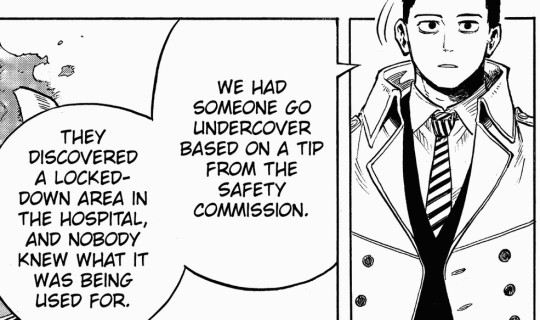
And Hawks dutifully relays it to the Commission. Thanks to this intel, they track down the clinic, send an undercover agent, snap a pic of one of the little noumu, and deduce that's where the secret, underground villain lair was all along. And the operation—which is notably issued by the HPSC itself, which entrust it to Endvr—is a go.
And you know what's even more telling? That once Ujiko is safely in hero custody and can no longer make minions for AFO... All the pro heros finally get the authorization to kill the League on sight.
So yeah. That was a really roundabout way of saying that the times where the Commission assassinates its enemies in cold blood are far from over. The League were just lucky to have AFO behind them to buy them time. But eventually, even that ran out, because the HPSC is not, and has never been, sunshine and rainbows and second chances
#bnha meta#meta:bnha society#hero public safety commission#lady nagant#hawks#my post#bnha spoilers#Meta:hawks#Meta:nagant#League of villains#Tsutsumi kaina#Takami keigo
603 notes
·
View notes
Text
one thing I find interesting about Hawks and Nagant is that both have been conditioned and trained to use body parts as their signature killing weapon. Nagant uses her hair as bullets and a rifle that emerges from her flesh. Hawks exercised so much control over his feathers that he learned how to sharpen them into blades and often wields them as such instead of support gear, despite how reliant he is on those feathers to fly.
I don't know, I just find it a neat detail, and I like to think that the equation body parts=weapons was instrumental to their grooming as child soldiers. "Quirk" is just a fancy word for individuality, and in fact it was translated that way in early fan scans. This is why so many characters are often depicted struggling to define who they are when their quirk doesn't measure up with society's standards. When superpowers are just a part of someone's identity, they become intrinsically tied to a person's self-perception and self-worth. And this would be even more the case for children like Kaina and Keigo, who were both self-conscious about their quirks and desperate to prove themselves.
We even have a precedent for this same grooming and it's AFO's manipulation of Tenko. In a world where it's normalized to teach kids that you are your quirk, it was easy for AFO to convince Tenko he was born to be violent and bloodthirsty because his quirk, his very individuality, claimed blood. His trauma and his young age just made him all the more emotionally malleable.
All I'm saying is that it would've been equally easy for the Commission to adopt the same manipulation tactic. If quirks become synonyms with identity, then it stands to reason that their application for violence also becomes part of who you are. In that light, when we see Hawks and Nagant as adults have little or no sense of self outside of their role as tools for the Commission, we know that the overwriting process is already complete. Their identity as civilians, as individuals, was erased. Effectively, Nagant and Hawks have already become sentient weapons themselves.
#my post#bnha#bnha meta#meta:nagant#meta:hawks#idk just some food for thought? someone probably already said this before#I might be the last person reaching this conclusion#lady nagant#hawks#kaina tsutsumi#takami keigo
169 notes
·
View notes
Text
No, I agree with this point! Think about Bakugo--his quirk is explosions, and he mirrors this by shouting at people and forcing his way through everything to what he wants. The Commission just drilled it into them from the very beginning on top of society doing it in the background.
This is a little off topic, but this extends to those who's quirks hurt them, and how's they're conditioned to and expected to work through that. Maybe it's the 'Plus Ultra' mentality for all of these, but Aoyama and his stomach ache, Iida pulling out his exhaust pipes, even Ochacho's quirk not being suited for her body, and (or course) literally everything that is Midoriya. All for the sake of getting good enough to help others.
Anyways not as poignant as the first post but I do think it's pervasive in their quirk/hero society as a whole.
one thing I find interesting about Hawks and Nagant is that both have been conditioned and trained to use body parts as their signature killing weapon. Nagant uses her hair as bullets and a rifle that emerges from her flesh. Hawks exercised so much control over his feathers that he learned how to sharpen them into blades and often wields them as such instead of support gear, despite how reliant he is on those feathers to fly.
I don't know, I just find it a neat detail, and I like to think that the equation body parts=weapons was instrumental to their grooming as child soldiers. "Quirk" is just a fancy word for individuality, and in fact it was translated that way in early fan scans. This is why so many characters are often depicted struggling to define who they are when their quirk doesn't measure up with society's standards. When superpowers are just a part of someone's identity, they become intrinsically tied to a person's self-perception and self-worth. And this would be even more the case for children like Kaina and Keigo, who were both self-conscious about their quirks and desperate to prove themselves.
We even have a precedent for this same grooming and it's AFO's manipulation of Tenko. In a world where it's normalized to teach kids that you are your quirk, it was easy for AFO to convince Tenko he was born to be violent and bloodthirsty because his quirk, his very individuality, claimed blood. His trauma and his young age just made him all the more emotionally malleable.
All I'm saying is that it would've been equally easy for the Commission to adopt the same manipulation tactic. If quirks become synonyms with identity, then it stands to reason that their application for violence also becomes part of who you are. In that light, when we see Hawks and Nagant as adults have little or no sense of self outside of their role as tools for the Commission, we know that the overwriting process is already complete. Their identity as civilians, as individuals, was erased. Effectively, Nagant and Hawks have already become sentient weapons themselves.
169 notes
·
View notes